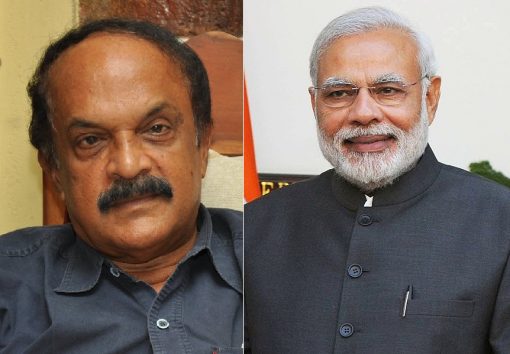
Sahitya Akademi Award winning writer Paul Zacharia recently courted controversy when speaking at an event organised in honour of the eminent Malayalam writer and cartoonist, O V Vijayan, in Palakkad, Kerala. Zacharia raised objection to the late writer (who is best remembered for his novel Khasakinte Itihasam) accepting the Sanjayan Puraskaram from Thapasya Art and Literary Forum – an organisation affiliated to the Rashtriya Swayamsevak Sangh (RSS). O V Vijayan had received the award in 2004, a year before his death. Zacharia’s statements charging Vijayan with having right-wing leanings angered many writers in Kerala, especially when he remarked, “If Hitler was alive today and he came and offered me an award, I would refuse it. In fact, if Narendra Modi, the murderer responsible for the killings in 2002 in Gujarat, offers me an award, of course I will refuse it rather than accept it!”
There was clear disagreement even among the writers present at the event, most of who contested Zacharia’s statement regarding O V Vijayan. Besides the writers in Kerala, certain right-wing groups have also taken offence with him for referring to Prime Minister Narendra Modi as a “murderer”. The Bharatiya Janata Party (BJP) secretary for Kerala B Gopalakrishnan threatened to have the writer beaten up unless he issued a public apology to the Prime Minister.
ICF: There are reports claiming that you called O V Vijayan a communalist who practiced “soft Hindutva”. Would you like to comment on this?
Paul Zacharia (PZ): I did not call O V Vijayan a communalist. I simply wanted to point out that he made a mistake in accepting the award from Thapasya Art and Literary Forum. Vijayan was a soft hearted man. He believed in what others said. It was this simple nature that led him to accept the award from Thapasya, an RSS funded organisation, without looking into the organisation’s work. The point I was trying to make was simple: no writer should accept awards from any religious fundamentalist organisation. Doing so is akin to endorsing such organisations.
ICF: Some people have pointed out that, in 2017, you accepted an award from Gulf Madhyamam, which is funded by an Islamic fundamentalist group. Would you like to respond to this?
PZ: Yes. I have faced quite a lot of backlash for accepting that award. In fact, I am planning to write an article on this issue. According to me, Madhyamam’s publications are as credible as Mathrubhoomi’s or Manornama’s. It was Madhyamam that offered me the award. The Gulf Madhyamam, which is one of Madhyamam’s subsidiaries, was one of the sponsors of the award. Both Gulf Madhyamam and Madhyamam are funded by Jamaat-e-Islami. Initially, both these publications only claimed to be news organisations but were actually propaganda channels meant to spread fundamentalist ideology. However, over the past 25-30 years, their work has shown clear secular primciples. Today, almost every writer of note has had their works — poems, short stories, and novels — published in their newspapers and bi-weeklies. A distinguished writer like M Mukundan has had his novels published in these; K Satchidanandan has contributed poems; people like me have written short stories for it. Moreover, works by people like M T Vasudevan Nair, Sugathakumari, and P Radhakrishnan have also appeared in the Madhyamam weekly. It was this Madhyamam weekly that offered me the award. For me, Madhayamam is a secular journal and many eminent secular thinkers have published their works in it. I find it extremely problematic when people compare Madhyamam with the RSS funded Thapasya. It is an RSS front organisation. Even after all these years, it continues to function as a front organisation. It has never had any secular leanings, and never will. If we read Thapasya, all that we will learn is communalism. The magazine pits communities against one another; breeds enmity between them. No mainstream writers of merit have ever contributed to this magazine. As opposed to this, Madhyamam magazine has widely covered issues like the discrimination faced by the LGBTQ community, land protests, workers rights, and student protests, among other things. Even though Madhyamam had communal undertones in the beginning, it has grown to become a secular space. It is no longer informed by Islamic fundamental ideologies.
Besides, we need to understand the difference between the majoritarian and minoritarian fundamentalism. Majoritarian fundamentalism eventually leads to the existence of organisations like Thapasya in Kerala. We need to unmask their principles. When Madhayamam had just started out, they offered me an award. I had refused it back then because I wasn’t sure of their secular credentials. It was during this initial period that they gave an award to the celebrated poet Satchidanandan, who accepted it. Later, it was given to T J S George, a secular democrat. It was after them that I accepted the award. By then, I had seen enough of their work to be sure of their political leanings. Secondly, in principle, I support minorities rather than the majority. But that does not mean I support fundamentalists from minority communities. I hope I have made my stand clear regarding this. Any form of fundamentalism will only lead to violence, be it Hinduism, Christianity, Islam, Sikhism, Judaism, or any other religion.




